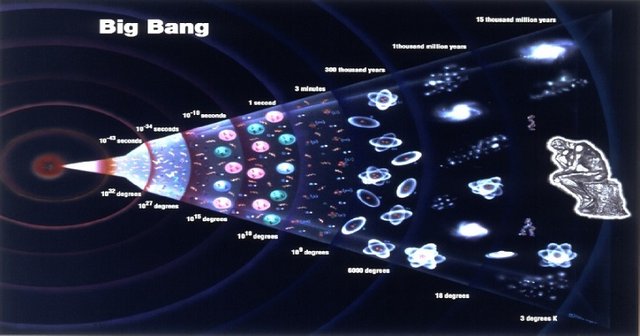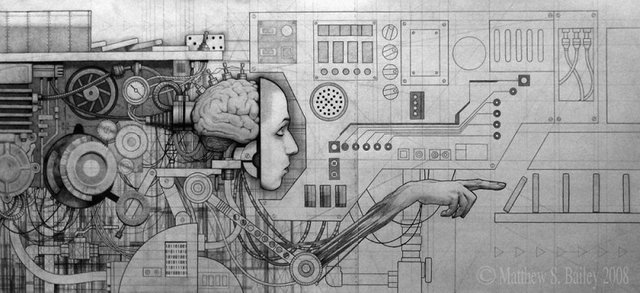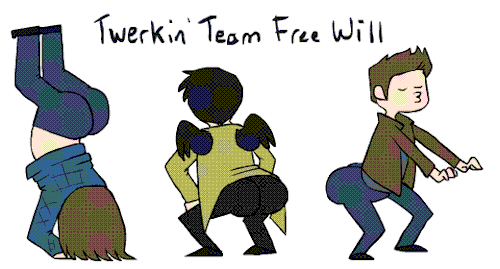[PHILOSOPHY] Free-Will or Determinism?
In a fascinating study from the early 1980s Benjamin Libet and his colleagues used electroencephalography (EEG) to record the brain activity of subjects who had been given the task to make a spontaneous hand movement when they wanted (Pfeifer and Bongard, 2007). Using a timer which the subjects were asked to read at the moment they had the 'desire' or 'idea' to act, the researchers found that on average, there was a 300 millisecond delay between the desire and the movement itself, and that brain activity started almost half a second before the desire to move the limb was perceived; i.e. that the brain had already planned the movement before the agent became aware of it and that it was unconscious neural activity that causes it. This should perhaps be seen as a blow to the idea of free will, but Libet points out that the agent can still choose to abort the action when the wish to perform the action was made aware. Maybe this activity that Libet called readiness potential doesn't even reflect the neural "decision" to perform the action; a correlation does not necessarily say anything about causation. In addition, the participants knew that they participated in a study in which they "voluntarily" and spontaneously would move a limb.

Whatever this experiment showed, I find it easier to argue against free will and for determinism.
All events have consequences and everything that ever happened preceded by a consequence. Are you with me on that premise? A collision between two membranes (hypothetically) collide, resulting in a "big bang". Quarks, gluons, electrons, mesons, etc. collide in all possible combinations (not random, I claim - every single particle moving in a specific path, depending on the previous event = how would they be able to move in any other way?) Biological life is created a few billion years later on earth, as a direct and specific result of the original event.

Based on the specific environmental conditions which also are direct consequences of the past events, more and more advanced brain organs that can perform more and more advanced tasks are developed. I have difficulty seeing how something called a will (or free will) has been able to detach itself from the chemical, physical and biological reality and chain of consequences. One common argument against this is that we have a reasoning ability. But what if this reasoning is only a facade of "free will", and that the agent with the reasoning ability would have ended up at the exact same results no matter what. And just because we experience "free will" obviously doesn't prove the existence of the same.

So, the main premise of my argument is thus that everything is consequential; event 1 leads to 2 event leading to the event 3, 4 and 5 and so on. I admit that we can reason about the why's and how's, but that it doesn't prove free will. It would seem very odd if humans would be some kind of "containers" with free will (the only species in the known universe) that are completely detached from this reality of consequences.
What are your thoughts on free-will?
Source:
Pfeifer, R. & Bongard, J. (2007) How the body shapes the way we think: A new view of intelligence. Cambridge, MA: The MIT Press.
Free will sure does not function the way it is supposed to, either from the commonsense view of things (which is driven by an intuitive but non-physical Mind/Body Dualism), or in the philosophical view, which lends way too much importance to the conscious mind . What do we get when we say free will is only an illusion? We do still have to decide what we are eating for breakfast, right? Don't we? My preference is to rely upon intuitive conceptualism with a bit of physical realism. rather than saying the self is an illusion; free will is an illusion; morality is an illusion; consciousness is an illusion or morality is an illusion, etc. We never perceive anything directly, as it truly is. Every time we open our eyes and see anything, that's a creative act. Each time we speak, we are making up a Story.

"A collision between two membranes (hypothetically) collide, resulting in a "big bang". Quarks, gluons, electrons, mesons, etc. collide in all possible combinations (not random, I claim - every single particle moving in a specific path, depending on the previous event = how would they be able to move in any other way?)"
That isn't true... the outcome of a single collision is never determined, it can be anything physics allows.
So basically, it means the outcome of the big bang since as it is a single and local event is not determined at all... No matter what happened, it is the result of a choice (quantum physics is probabilistic not determinist).
As we go further away from the instant of the big bang and the number of particles increase, it becomes more and more determinist, in the sense that the most probable outcome will always dominate no matter what happens locally.
So our universe, is a result of a (and probably many) choice(s) for sure (can be the most probable or not, but a "choice" in term of process has been made).
Considering human do we have free will ?
Yes, we have free will, no matter how an action is dumb, we still have the choice to make it...
The real question is rather: Does it matter ?
Well most of the time, it doesn't matter, because the decision of the collective will outweight a single "random act" and in the end, it won't change anything. But still we have free will, still we have the possibility to influence our surrounding, hence freewill.
Free will is brain dependent. We must be adults, sane, be not drunk, to have "free will". In fact what we call "free will" is nothing more than self awareness and conciousness.
I've never seen a good definition of "free will".
Does a pocket calculator have free will? Nothing external prevents it from acting in any way. It's desire to provide correct answers comes entirely from its own wiring. This is no different from my desires to act coming from my brain or soul or wherever you might think free will could possibly originate from.
But I think any definition that allows a pocket calculator to have free will is useless.
Noted you didn't tag this on 'anarchism'. They might have been cross I suppose... If there's no free will, it makes the idea of self-determination a mental illness. Chuckle.
lol!
You'll probably enjoy this TED talk, if you haven't already seen it. It's a great talk on this subject and includes a modernized version of the experiment you mentioned.
Thank you, very interesting!
Why would natural selection have favoured the ability to recognize choice, if you could not act on it ?
I could think of many examples from the animal kingdom, where it would be favorable for an agent in terms of survival if it had the ability to choose and ignore its 'nature'. But maybe consciousness has an evolutionary advantage in the way that it gives us with the illusion of responsibility and control, which comforts us into believing that we are in control of what we will do ahead of time.
Anthony Cashmore, professor in biology, argues that free will is an illusion emerged from consciousness, and that consciousness has an evolutionary advantage of giving the illusion of responsibility.
“Whereas the impressions are that we are making ‘free’ conscious decisions, the reality is that consciousness is simply a state of awareness that reflects the input signals, and these are an unavoidable consequence of GES [genes, environment, and stochasticism]”
http://www.informationphilosopher.com/solutions/scientists/cashmore/
Your mind would not have any chance of knowing in ad vance that i would reply to your post, even if we both were based on complete determinism. Therefore you chose to reply.
I will paint you a perspective that resolves this duality. Soon.
Looking forward to it! :)
I think free will and determinism both have a place in life. Determinism has to do with more of a global process and tendencies and it’s up to an individual to follow the flow or take an initiative against it. Let’s say you are a gypsy, homosexual or a Jew living in Europe in 1932. Most of these individuals were destined to die under Nazi’s cleansing policies. Most of them thought that “it will pass, things will somehow work themselves out, where will we go, are we going to live our properties, money, our way of life?” Those most were affected by determinism or a general tendency. However, there were people who smelled the rot early and were able to escape, often leaving all their belongings, money or properties. I think this was an act of free will.
Another example. This happens in the late forties if I remember correctly. Vasili Stalin, the son of the Soviet dictator was supposed to follow fly in a plane following the soccer team to another city. The famous psychic Wolf Messing contacted Stalin to postpone the flight. Stalin didn’t postpone the flight but told his son to take a train. The plane crashed and all the passengers died. If Vasili would be on that plane he’d definitely die as well. The deterministic way of events was changed and he remained alive.
Surely, one can argue that those “exceptions” were also pre-determined, but this is where I think the demarcation line passes.
Very interesting topic. I'd like to hear more about this but I don't feel qualified in terms of the descriptive phrases used to make my own comment yet. I had never thought of free will in this way before.